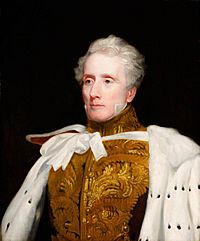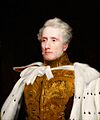Charles Grant, 1st Baron Glenelg facts for kids
Quick facts for kids
The Lord Glenelg
|
|
|---|---|

1837 portrait by Henry Perronet Briggs
|
|
| President of the Board of Trade | |
| In office 4 September 1827 – 11 June 1828 |
|
| Monarch | George IV |
| Prime Minister | The Viscount Goderich The Duke of Wellington |
| Preceded by | William Huskisson |
| Succeeded by | William Vesey-FitzGerald |
| Secretary of State for War and the Colonies | |
| In office 18 April 1835 – 20 February 1839 |
|
| Monarch | William IV Victoria |
| Prime Minister | The Viscount Melbourne |
| Preceded by | The Earl of Aberdeen |
| Succeeded by | The Marquess of Normanby |
| Personal details | |
| Born | 26 October 1778 Kidderpore, Calcutta, British India |
| Died | April 23, 1866 (aged 87) Cannes, France |
| Nationality | Anglo-Indian |
| Political party | Tory Whig |
| Alma mater | Magdalene College, Cambridge |
Charles Grant, 1st Baron Glenelg (born October 26, 1778 – died April 23, 1866) was an important Scottish politician. He also worked as a colonial administrator, which means he helped manage parts of the British Empire. One of his main jobs was being the Secretary of State for War and the Colonies.
Contents
Early Life and Education
Charles Grant was born in a place called Kidderpore in British India. His father, also named Charles Grant, was a very important person. He was the chairman of the directors of the British East India Company. This company was a powerful trading group that ruled large parts of India.
Charles had a brother, Sir Robert Grant, who also became a politician. Robert later became the Governor of Bombay in India. Charles went to Magdalene College, Cambridge, a famous university. He finished his studies there in 1802. Later, in 1807, he became a lawyer.
Becoming a Politician
In 1811, Charles Grant started his political career. He was elected to the British House of Commons. This is where laws are made in the United Kingdom. He represented the area of Inverness Burghs.
He held this position until 1818. After that, he became the Member of Parliament for Inverness-shire.
Early Government Roles
From 1813 to 1819, Charles Grant worked as a Lord of the Treasury. This meant he helped manage the government's money. In 1819, he became the Chief Secretary for Ireland. This was a senior role in the government of Ireland.
He also became a Privy Counsellor. This is a group of trusted advisors to the King or Queen. In 1823, he was made Vice-President of the Board of Trade. This role involved helping with trade and business. From 1827 to 1828, he was the President of the Board of Trade. He was also the Treasurer of the Navy at the same time.
Changing Political Sides
Charles Grant was first part of the Tory political group. But he disagreed with them about some important changes, called "Reform." So, he decided to join another political group, the Whigs.
From 1830 to 1834, he was the President of the Board of Control. This board was in charge of overseeing the British East India Company and how India was governed. While in this role, he helped create a new law in 1833. This law changed how the government of India worked.
Leading the Colonies
In April 1835, Charles Grant got a very important job. He became the Secretary of State for War and the Colonies. This meant he was responsible for both military matters and all the British colonies around the world. At this time, he was also given a special title: Baron Glenelg. This title was named after Glenelg in Scotland.
His time in this job was quite difficult. He had serious disagreements with Sir Benjamin d'Urban. Sir Benjamin was the Governor of the Cape Colony in South Africa.
Challenges in Canada
Even bigger problems came from how he managed Canada. He had disagreements with King William IV and other important people. These arguments were about how Canada should be run.
In 1837, a rebellion broke out in Canada. Many people in the British Parliament strongly criticized Lord Glenelg's policies. He also had arguments with Lord Durham, another important figure. Some of his own colleagues in the government even wanted him to be replaced. Because of all these challenges, Lord Glenelg resigned from his position in February 1839.
Later Life and Legacy
Lord Glenelg passed away in Cannes, France, in April 1866. He was 87 years old. Since he did not have any children to inherit his title, the special title of Baron Glenelg ended when he died.
A ship was named after him, called the Lord Glenelg. This ship traveled from Britain to Australia in 1841.
Images for kids
 | Victor J. Glover |
 | Yvonne Cagle |
 | Jeanette Epps |
 | Bernard A. Harris Jr. |


